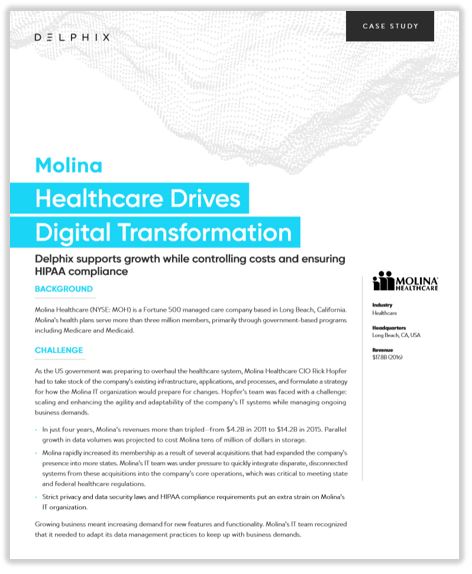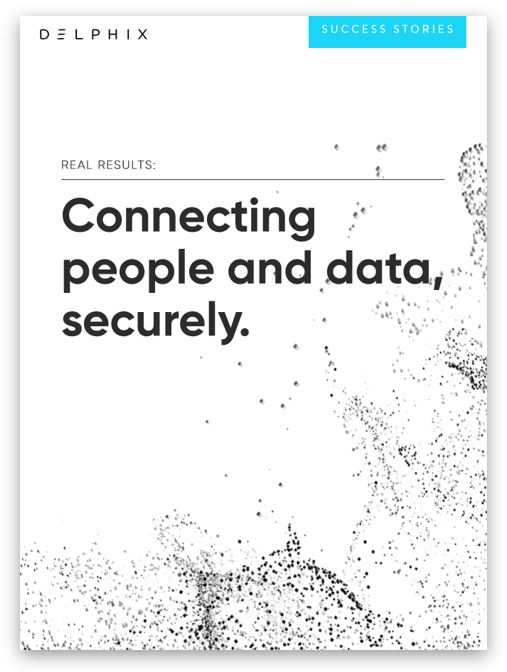Molina Healthcare Drives Digital Transformation
To satisfy data privacy and security requirements, Molina adopted data-masking practices from Delphix to secure protected health information (PHI) data in non-production environments. Together with Delphix, Molina developed a solution that automatically masks and delivers secure datasets to downstream environments for development, testing, and analytics.
5 reasons why you need to remove admin rights
Time and time again we see large-scale breaches taking place that would have been completely mitigated through the removal of admin rights. Yet, seemingly for the sake of ease and access, many organizations continue to grant a large majority of their employees full administrator privileges.
BECU Delivers Faster, More Secure Digital Enhancements
Delphix enabled Boeing Employees’ Credit Union (BECU) to exceed its goal for data masking, helping the firm bolster already rigorous standards for protecting confidential information. BECU also leverages the virtualization capabilities of the Delphix Dynamic Data Platform to reduce the overall time and effort to distribute masked data, which makes it possible for BECU to deploy products up to twice as fast.
How Industry Leaders Protect Data Without Sacrificing Agility
In a world where cybersecurity incidents make headlines on a weekly basis, the watchword is security. More than 9 billion personal records have been stolen in the last five years, escalating security and privacy concerns. Data security is now a top imperative for the business, and responding to regulatory pressure is a key hurdle to overcome.
A No Hassle Guide to Effective Third-Party Risk Management
The current third-party cyber risk assessment model is cumbersome, outdated, not scalable and lacks visibility into the entire threat landscape. It’s no wonder that CISOs lay awake at night, concerned about their risk profile and the effect of vendors on it.
Case Study: A Force Multiplier for Third-Party Cyber Risk Management
With a rapidly growing business that includes a robust vendor ecosystem and portfolio of companies, Blackstone needed a force multiplier that would help them create an efficient, effective and scalable third-party cyber risk management program.
An Executive's Guide to GDPR Preparation
The new EU General Data Protection Regulation (GDPR) looms and will take effect in May 2018, but according to Gartner, less than 50 percent of companies* are on track to be compliant by the due date. GDPR is the most significant change in data privacy regulation in more than 20 years. It represents an extraordinary shift in the way businesses will be expected to operate when they gather, process, maintain, and protect personal data of EU data subjects. Any organization that retains information of EU data subjects must be in compliance or face huge fines of up to 4% of worldwide turnover.
Absolute for GDPR Compliance
Learn how Absolute gives you the power to identify potential security threats and respond in real-time before they become costly security incidents, requiring a breach notification.
Simplify Reporting with AlienVault® USM Anywhere™
The reporting features in AlienVault® USM Anywhere™ make it fast and simple to get the visibility you need to maintain a strong security posture and to satisfy the reporting requirements of your compliance auditors, your executives, and your board of directors.
GDPR vendor management: We've seen this movie before
Companies increasingly rely on third-party vendors to meet their operational needs. Yet, managing the data risks in an outsourced world has become a major challenge for security, compliance, procurement legal and executive management.
Complying With GDPR: What All Organizations Need to Know
Learn how to ensure your organization is compliant with the General Data Protection Regulation.
AlienVault® USM Anywhere™
AlienVault® USM Anywhere™ accelerates and centralizes threat detection, incident response, and compliance management for your cloud, on-premises, and hybrid environments. USM Anywhere includes purpose-built cloud sensors that natively monitor your Amazon Web Services (AWS) and Microsoft Azure cloud environments, and cloud applications like Office 365. On premises, lightweight virtual sensors run on Microsoft Hyper-V and VMware ESXi to monitor your virtual private cloud and physical IT infrastructure.
Legitimate Interests: Being Comfortable with Uncertainty
With the EU General Data Protection Regulation right around the corner, you have probably heard that there will be six legal bases for processing personal data – consent, performance of a contract, compliance with a legal obligation, vital interests, public interest or official authority, and legitimate interests.
Accelerate GDPR Compliance with AlienVault® Unified Security Management® (USM
Privacy of personal information has always been seen as a fundamental right by the citizens of the European Union (EU). However, this right is one that is constantly challenged by ongoing technological developments and international business practices, particularly with more personal information being stored and transmitted electronically. In response, the EU passed the General Data Protection Regulation (GDPR), which was adopted on April 27, 2016, and will become enforceable on May 25, 2018.























